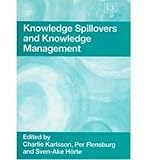Knowledge spillovers and knowledge management [Book] / edited by Charlie Karlsson, Per Flensburg, Sven-Ake Hörte.
Material type: TextPublication details: Northampton, MA : Northampton, MA : Edward Elgar Pub., 2004.Description: x, 510 p. : ill. ; 25 cmISBN:
TextPublication details: Northampton, MA : Northampton, MA : Edward Elgar Pub., 2004.Description: x, 510 p. : ill. ; 25 cmISBN: - 1843767856
- Technology transfer -- Economic aspects -- Congresses
- Knowledge management -- Congresses
- Technological innovations -- Economic aspects -- Congresses
- Technology transfer -- European Union countries -- Economic aspects -- Congresses
- Knowledge management -- European Union countries -- Congresses
- Technological innovations -- European Union countries -- Economic aspects -- Congresses
- 658.4 038 22
- 658.4038
| Item type | Current library | Call number | Status | Date due | Barcode | Item holds |
|---|---|---|---|---|---|---|
 Books
Books
|
Junaid Zaidi Library, COMSATS University Islamabad | 658.4038 KNO (Browse shelf(Opens below)) | Available | 49968 | ||
 Books
Books
|
Junaid Zaidi Library, COMSATS University Islamabad | 658.4038 KNO (Browse shelf(Opens below)) | Available | 49882 |
"This book is a result of ... a workshop on Knowledge spillovers and knowledge management, held September 19-21, 2002 at the Centre for Information Logistics in Ljungby, Sweden"--Pref.
Includes bibliographical references and index.
This book reveals the key importance, in terms of international competitiveness, of firms' capability to adapt to, and develop, new technologies. At the same time, the authors argue that the sheer complexity of emerging technologies is such that the knowledge involved in their creation is likely to be dispersed and distributed between many individuals and over numerous locations. The authors argue that even if one assumes that the internal knowledge base is of strategic importance to many companies, most of the knowledge used by the majority of companies is developed outside the company. Since much knowledge is tacit in nature, the location of companies and their different departments become vital in accessing such knowledge, and there are strong reasons to believe that spillover effects are geographically bounded. Hence, it may often be of strategic importance to companies and their competitiveness to be represented in the 'right' industrial clusters. This book highlights a number of issues at the leading edge of both research and policy making, such as knowledge generation/production, knowledge distribution/transfer, knowledge spillovers, learning, knowledge management, information logistics, industrial clusters, industrial networks and regional innovation systems. This book will appeal to academics and researchers of knowledge management, technology and innovation and industrial organisation. Policy makers and planners in international organisations, national and regional governments - in particular those dealing with R&D policies, industrial policies and regional policies - will also find much to engage them.
All.


There are no comments on this title.